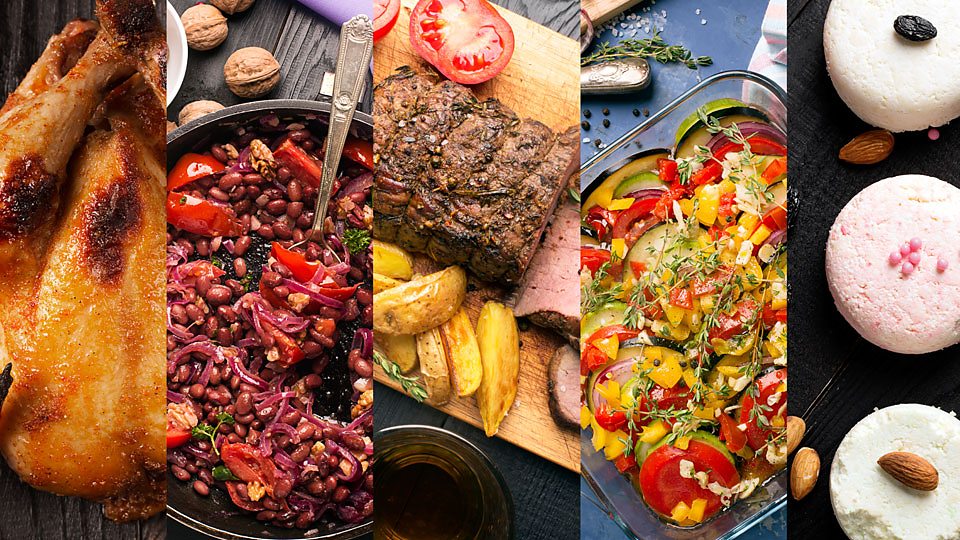为什么有些人喜欢某些口味,而有些人却受不了?在本期《随身英语》中,我们听名厨赫斯顿(Heston Blumenthal)和神经学家查尔斯·朱克(Charles Zucker)对“口味”的分析。他们说,我们的偏好根植于记忆、基因和用餐的环境中,不过口味也会随着时间而改变。
课文内容
Vocabulary: tastes 词汇: 口味
What's your favourite flavour? Maybe you like your grub nice and spicy? Perhaps you have a sweet tooth? Or are you partial to a salty, savoury snack?
By now you're probably imagining something delicious, but take a moment to ponder this: why do some people adore certain flavours while others can't stand them? For example, oysters. They turn my stomach, but some spend lavishly on the slippery shellfish.
According to celebrity chef Heston Blumenthal, our taste preferences are strongly linked to our memories. Certain flavours might bring back the sounds and smells of a seaside holiday, or an ice-cream might trigger memories of enjoying a childhood treat. This "positive nostalgia" has a powerful effect on how we experience food.
Likewise, our surroundings have an impact on culinary pleasure. The same glass of wine can taste different depending on the background music. Blumenthal believes playing loud music makes people eat more quickly, while classical music makes them spend more money on wine.
Alongside memory and ambience, our genetics also have a powerful impact on taste preferences. Neuroscientist Charles Zucker from Columbia University believes all animals are "pre-wired" to prefer sweet tastes over sour. "There are no lions out in the wild drinking tonic water," he says.
On a more individual level, our personal genetic inherited preferences are significant. "And that is likely to greatly impact how much sugar I want to have in my coffee," says Dr Zucker. "It might be that I need six spoons of sugar to get the same level of satisfaction and reward that you get with only two."
Coffee is also an interesting example of how our tastes change over time. Most children don't like the maltiness of beer or the bitterness of strong coffee. But many adults enjoy the social reward – the relaxing effects of alcohol or the stimulation gained by coffee.
These are what we call acquired tastes – things we gradually learn to like - whether it's because our palates become more sophisticated, or because we crave the social effects of the foods.
For me though, I'm yet to see the allure in oysters, whether social or epicurean!
词汇表
grub (俚语)吃的,食物
(to have) a sweet tooth 吃甜食的嗜好
(to be) partial (to) 偏爱
savoury 咸的
to ponder 仔细思考,衡量
to turn someone’s stomach 让人恶心
lavishly 极其大方地
slippery 滑溜溜的
to bring back 带回来
to trigger 触发
nostalgia 对往事的依恋
culinary 烹饪的
ambience (地点、环境的)气氛
tonic water 汤利水
genetic 基因的
maltiness 有麦芽的感觉
bitterness 苦味
acquired taste 后天培养的品味
palate 口味,味觉
epicurean 美食的
测验与练习
1. 阅读课文并回答问题。
1. How can memory affect the tastes we like?
2. What kind of music would Blumenthal suggest a restaurant owner plays if he wants customers to finish their meals quickly?
3. What would you call a liking for red wine that develops over time?
4.Which phrase means: 'in their natural environment' and 'without humans'?
5. True or false: The author believes there is a social reward to be gained from eating oysters.
2. 请你在不参考课文的情况下完成下列练习。选择一个意思合适的单词填入句子的空格处。
1. Walking by the beach in autumn ______ lots of sad memories.
ponders nostalgias triggers back brings back
2. I'm very ______ grapes. I just can't stop eating them.
partial to partial partial for impartial
3. Lucas doesn't have a very developed ______. He only eats bread and butter.
culinary grub palate epicurean
4. Travelling to Thailand is a ______ adventure. The flavours are incredible!
nostalgic lavish acquired culinary
5. I'm afraid I have ______. I eat dessert after every meal, even breakfast.
sweet tooth sweet teeth a sweet tooth very sweet teeth
答案
1. 阅读课文并回答问题。
1. How can memory affect what tastes we like?
Certain flavours can bring back happy memories, which means we're more likely to enjoy those flavours.
2. What kind of music would Blumenthal suggest a restaurant owner plays if he wants customers to finish their meals quickly?
Blumenthal says playing loud music makes customers eat more quickly.
3. What would you call a liking for red wine that develops over time?
You call a taste that develops gradually 'an acquired taste'.
4. Which phrase means: 'in their natural environment' and 'without humans'?
In the wild.
5. True or false: The author believes there is a social reward to be gained from eating oysters.
False, the author believes there is no social benefit to eating oysters, and no pleasure either!
2. 请你在不参考课文的情况下完成下列练习。选择一个意思合适的单词填入句子的空格处 。
1. Walking by the beach in autumn brings back lots of sad memories.
2. I'm very partial to grapes. I just can’t stop eating them.
3. Lucas doesn't have a very developed palate. He only eats bread and butter.
4. Travelling to Thailand is a culinary adventure. The flavours are incredible!
5. I'm afraid I have a sweet tooth. I eat dessert after every meal, even breakfast.


 3342次下载
点击下载
3342次下载
点击下载
 2621次下载 点击下载
2621次下载 点击下载
 4734次下载 点击下载
4734次下载 点击下载
 1854次下载 点击下载
1854次下载 点击下载
 1391次下载 点击下载
1391次下载 点击下载
 1391次下载 点击下载
1391次下载 点击下载











